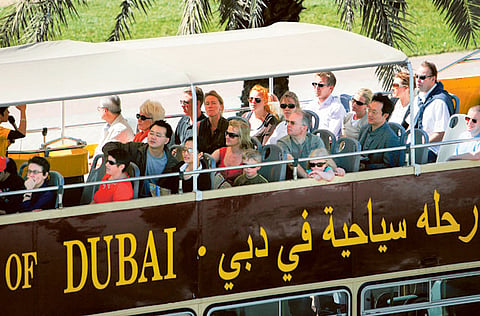Rediscovering the rationale for creating an economy based on trade and tourism
There is an evident irony in diversification’s credo

It used to be said among analysts that the Gulf spent too much time in the comfort zone of its reliable energy resources to commit properly to developing other forms of economic growth. Only the pressure of low oil prices spurred those efforts, as an apparent necessity. And when oil prices picked up, the incentive for structural change went missing again.
However, non-oil industrialisation has made ground, and in the distinct case of Dubai the prior rationale for creating an economy based on trade and tourism, and commerce generally, has been rediscovered.
Across the region, a set of buzzwords -- liberalisation, deregulation, governance, integration -- have become commonplace, linked by the idea of conforming with international expectations, with the motivation of attracting overseas interest, expertise and finance.
In essence, inspired locally or not, there is an acceptance of the kinds of imperatives induced by globalisation.
Yet, even besides the residual debate about that phenomenon itself (occasionally labelled as the triumph of markets over government or politics), it does beg the question of whether the presumptions in favour of such cross-border compliance -- from membership of the WTO to degrees of transparency in policymaking and corporate management and accounts -- are fully embraced and agreed.
Some might say it is obvious that the quest to broaden the productive base while adopting globally-decreed norms in the likes of financial practice and social responsibility is geared to achieving economic, political and strategic security, and moreover (according to the current jargon) on a sustainable basis.
Yet the objectives of change are not wholly preordained in their detail, and may be constrained within certain boundaries. For governments in the Gulf, just as anywhere else, the chosen goals are meant to be those that can be beneficially managed to work within a certain established order.
As in other societies, there is stability to maintain, vested interests to observe, and popular sentiment to be gauged, with policymaking to be determined either by a consensual or decreed decision at leadership level. There is even the issue of what national identity is, and how it can be protected.
In this regard, the disturbances of the Arab Spring represent an historical intervention, whether turning out to be a major or minor factor for the regional economy in retrospect.
Change, then -- its direction, its proposed extent and its rationale in the Gulf -- will involve some kind of qualification of what Western benchmarks might imply. At the same time, it will naturally be different in style and content from the examples offered by the economic powerhouses of the rest of Asia and the East, where the paths of Russia, China, India and the countries of the Pacific Rim are guided by their own respective backgrounds, while challenged by globalisation’s freewheeling inclinations.
More pertinently, there is an evident irony in diversification’s credo. Just as a well-spread asset portfolio didn’t help much when all markets took the hit in 2008, so turning to the rest of the world for interaction, exchange and mutual economic dependence hasn’t been so wonderful at a time when recession has been stalking the world economy.
Risk was shown not to be diminished by sharing but actually enhanced, by accumulated misunderstanding, at least in the financial arena. Trading regional liquidity for global exposure is, in that sense, opting for the fire rather than the frying pan.
Even so, change, by evolution not revolution, remains a prevailing theme, and a steady flow of publications refer to its nature and its promise.
As a benchmark document alluding to the underlying inertia, the Economist Intelligence Unit’s 2009 research study paper on the outlook to 2020 found that the GCC’s structural dependences on expatriate labour and oil exports “have hardly changed over the past ten years and are likely to take more than another decade to address”.
The oft-repeated remedy was cited in last year’s Arab World Competitiveness report produced by the World Economic Forum and the OECD, namely a “vibrant, entrepreneurial private sector” to gain the benefits of trade and investment and thereby reduce unemployment. Overhauling the education system and promoting efficiency of markets are crucial to the reform agenda that meets the prescribed method of development (see chart).
Meanwhile, in their coverage of the Mena region, the Bertelsmann Foundation’s Transformation Index takes any country’s prospective ideal to be “democracy under the rule of law and a market economy anchored in principles of social justice”. With such criteria, numbers for per capita wealth will always be insufficient in denoting progress, relative to other measures of humanity.
Few man-made things stay the same in life, and if nothing much lasts forever, then change is coming anyway. So it’s just a matter of trying to shape it, and define the terms by which progress might be measured, always somewhat in the eye of the beholder.
Sign up for the Daily Briefing
Get the latest news and updates straight to your inbox



